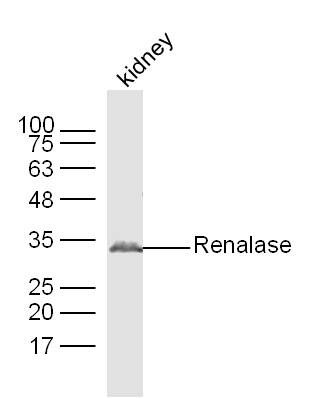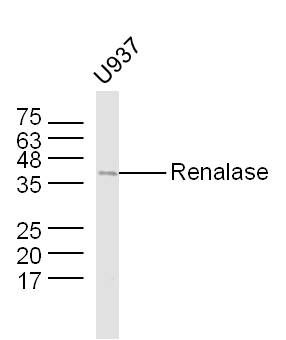Renalase Polyclonal Antibody
Purified Rabbit Polyclonal Antibody (Pab)
- SPECIFICATION
- CITATIONS
- PROTOCOLS
- BACKGROUND

Application
| WB, IHC-P, IHC-F, IF, E |
|---|---|
| Primary Accession | Q5VYX0 |
| Reactivity | Rat, Pig, Dog |
| Host | Rabbit |
| Clonality | Polyclonal |
| Calculated MW | 36 KDa |
| Physical State | Liquid |
| Immunogen | KLH conjugated synthetic peptide derived from human Renalase |
| Epitope Specificity | 201-300/342 |
| Isotype | IgG |
| Purity | affinity purified by Protein A |
| Buffer | 0.01M TBS (pH7.4) with 1% BSA, 0.02% Proclin300 and 50% Glycerol. |
| SUBCELLULAR LOCATION | Secreted. |
| SIMILARITY | Belongs to the renalase family. |
| Important Note | This product as supplied is intended for research use only, not for use in human, therapeutic or diagnostic applications. |
| Background Descriptions | Renalase, a novel FAD dependent amine oxidase, is secreted by the kidney, degrades circulating catecholamines, and modulates cardiac function and lowers systemic blood pressure. In vivo, it has been found to decrease cardiac contractility and heart rate and prevents a compensatory increase in peripheral vascular tone, possibly explaining the association between increased plasma catecholamines and heightened cardiovascular risk. The plasma concentration of renalase is markedly reduced in patients with end-stage renal disease, as compared with healthy subjects. The administration of renalase (or renalase mimics) may offer a new approach to the treatment of hypertension commonly found in renal disease, which is associated with a marked increase in cardiovascular disease. |
| Gene ID | 55328 |
|---|---|
| Other Names | Renalase, 1.6.3.5, Monoamine oxidase-C, MAO-C, RNLS, C10orf59 |
| Target/Specificity | Secreted into the blood by the kidney. Highly expressed in the kidney, expressed at lower level in heart, skeletal muscle and small intestine. Its plasma concentration is markedly reduced in patients with end-stage renal disease, as compared with healthy subjects. |
| Dilution | WB=1:500-2000,IHC-P=1:100-500,IHC-F=1:100-500,IF=1:100-500,ELISA=1:5000-10000 |
| Storage | Store at -20 ℃ for one year. Avoid repeated freeze/thaw cycles. When reconstituted in sterile pH 7.4 0.01M PBS or diluent of antibody the antibody is stable for at least two weeks at 2-4 ℃. |
| Name | RNLS |
|---|---|
| Synonyms | C10orf59 |
| Function | Catalyzes the oxidation of the less abundant 1,2-dihydro- beta-NAD(P) and 1,6-dihydro-beta-NAD(P) to form beta-NAD(P)(+). The enzyme hormone is secreted by the kidney, and circulates in blood and modulates cardiac function and systemic blood pressure. Lowers blood pressure in vivo by decreasing cardiac contractility and heart rate and preventing a compensatory increase in peripheral vascular tone, suggesting a causal link to the increased plasma catecholamine and heightened cardiovascular risk. High concentrations of catecholamines activate plasma renalase and promotes its secretion and synthesis. |
| Cellular Location | Secreted. |
| Tissue Location | Secreted into the blood by the kidney. Highly expressed in the kidney, expressed at lower level in heart, skeletal muscle and small intestine. Its plasma concentration is markedly reduced in patients with end-stage renal disease, as compared with healthy subjects. |

Thousands of laboratories across the world have published research that depended on the performance of antibodies from Abcepta to advance their research. Check out links to articles that cite our products in major peer-reviewed journals, organized by research category.
info@abcepta.com, and receive a free "I Love Antibodies" mug.
Provided below are standard protocols that you may find useful for product applications.
If you have used an Abcepta product and would like to share how it has performed, please click on the "Submit Review" button and provide the requested information. Our staff will examine and post your review and contact you if needed.
If you have any additional inquiries please email technical services at tech@abcepta.com.













 Foundational characteristics of cancer include proliferation, angiogenesis, migration, evasion of apoptosis, and cellular immortality. Find key markers for these cellular processes and antibodies to detect them.
Foundational characteristics of cancer include proliferation, angiogenesis, migration, evasion of apoptosis, and cellular immortality. Find key markers for these cellular processes and antibodies to detect them. The SUMOplot™ Analysis Program predicts and scores sumoylation sites in your protein. SUMOylation is a post-translational modification involved in various cellular processes, such as nuclear-cytosolic transport, transcriptional regulation, apoptosis, protein stability, response to stress, and progression through the cell cycle.
The SUMOplot™ Analysis Program predicts and scores sumoylation sites in your protein. SUMOylation is a post-translational modification involved in various cellular processes, such as nuclear-cytosolic transport, transcriptional regulation, apoptosis, protein stability, response to stress, and progression through the cell cycle. The Autophagy Receptor Motif Plotter predicts and scores autophagy receptor binding sites in your protein. Identifying proteins connected to this pathway is critical to understanding the role of autophagy in physiological as well as pathological processes such as development, differentiation, neurodegenerative diseases, stress, infection, and cancer.
The Autophagy Receptor Motif Plotter predicts and scores autophagy receptor binding sites in your protein. Identifying proteins connected to this pathway is critical to understanding the role of autophagy in physiological as well as pathological processes such as development, differentiation, neurodegenerative diseases, stress, infection, and cancer.



